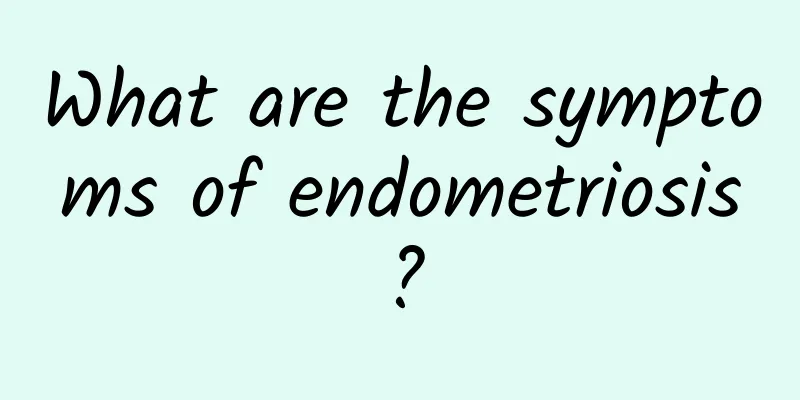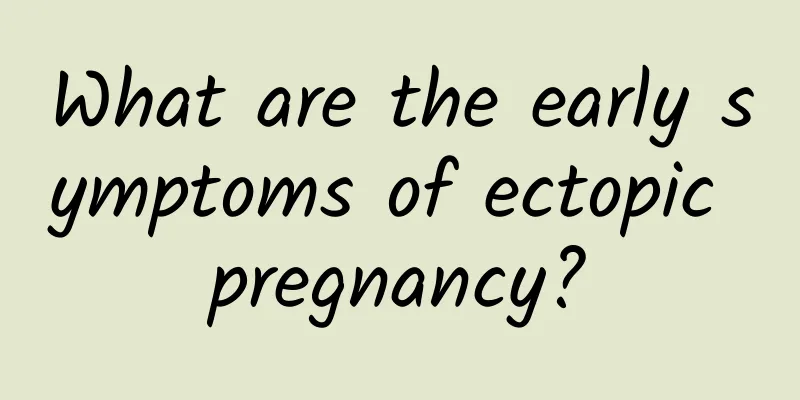What are the symptoms of endometriosis?

|
What are the symptoms of endometriosis? Patients with endometriosis often have symptoms such as heavy menstruation, dysmenorrhea, sexual pain, and infertility; if ectopic endometrium appears in the bladder and intestines, urinary system discomfort symptoms such as urgency, frequency, pain, hematuria, and abnormal bowel movement symptoms such as constipation and diarrhea may also occur. 1. Excessive menstrual flow Patients often experience increased menstrual flow and prolonged menstrual periods because when hormones stimulate the endometrium, the endometrium in the normal position will shed and the ectopic endometrium will also shed, leading to increased menstrual flow. 2. Dysmenorrhea This is the most typical manifestation of endometriosis. Patients often begin to experience abdominal pain two days before menstruation. After menstruation, the abdominal pain symptoms will become more obvious. The abdominal pain will gradually disappear until the end of menstruation. The more serious the condition, the more severe the abdominal pain. 3. Pain during sexual intercourse In some patients, the endometrium grows in the rectal fossa of the uterus and the rectal septum of the vagina. During intercourse, the ectopic endometrium will be stimulated, causing swelling and pain in the surrounding tissues. Because of the discomfort such as pain during sexual intercourse, patients will be afraid of sexual intercourse over time, resulting in a decrease in sexual desire. 4. Infertility Because the patient's ectopic endometrium bleeds every month, it is easy to cause adhesions around the fallopian tubes, affecting the output of the egg and preventing the formation of a fertilized egg. Even if a fertilized egg is formed, it will hinder the fertilized egg from entering the uterine cavity. Therefore, patients with endometriosis often have infertility problems. 5. Urinary system discomfort symptoms If ectopic endometrium appears in the bladder, or invades and compresses the ureter, the patient will experience urinary system discomfort symptoms such as urgency, frequency, pain, hematuria, etc. These symptoms are usually cyclical, and these abnormal manifestations will appear when menstruation comes, and these abnormal manifestations will be relieved or disappear after the end of menstruation. 6. Abnormal bowel movements If ectopic endometrium appears in the intestines, patients often experience symptoms such as abdominal pain, constipation, diarrhea, and sometimes periodic bloody stools. |
<<: What are the main things to pay attention to after abortion?
>>: Can vaginal ultrasound detect adnexitis?
Recommend
What to do if you have stomach pain during menstruation
What should I do if I have stomach pain during me...
What are the causes of cervical hypertrophy?
What are the causes of cervical hypertrophy? Cerv...
Will women get vaginitis if they wipe with paper after urinating? What are the common causes of vaginitis?
Some time ago, I met a girl in her early 20s in t...
Which is less harmful to the body, abortion or taking emergency contraceptive pills?
Which is less harmful to the body, abortion or ta...
How do we prevent cervical hypertrophy?
Cervical hypertrophy is a common disease in gynec...
What is the specific cause of ovarian cysts?
Ovarian cysts are not unfamiliar to women ! Perha...
After a miscarriage, it is necessary to check whether the miscarriage is complete in time. How to judge whether it is complete?
There are many ways to judge whether a miscarriag...
Can I get pregnant if I have adnexitis?
Gynecological disease experts talked to everyone ...
What are the main symptoms of irregular menstruation?
What we often call irregular menstruation is irre...
How to treat mild cervical erosion? Timely treatment
Cervical erosion can be mild or severe. Many peop...
Making 5 small changes in your daily life can help accelerate exercise results!
With the trend of exercise prevailing, many peopl...
Here are some ways to treat cervical hypertrophy:
Many women want to know how to treat cervical hyp...
What are the symptoms of having endometriosis?
For women of childbearing age, endometriosis is a...
Are pelvic effusion and pelvic inflammatory disease the same thing? They are not the same thing.
Pelvic effusion and pelvic inflammatory disease a...
Why can cervicitis not be cured for a long time?
Cervicitis is extremely detrimental to the physic...









